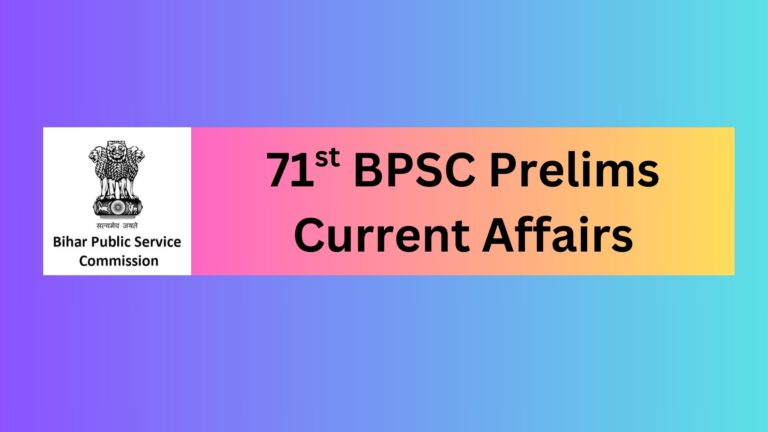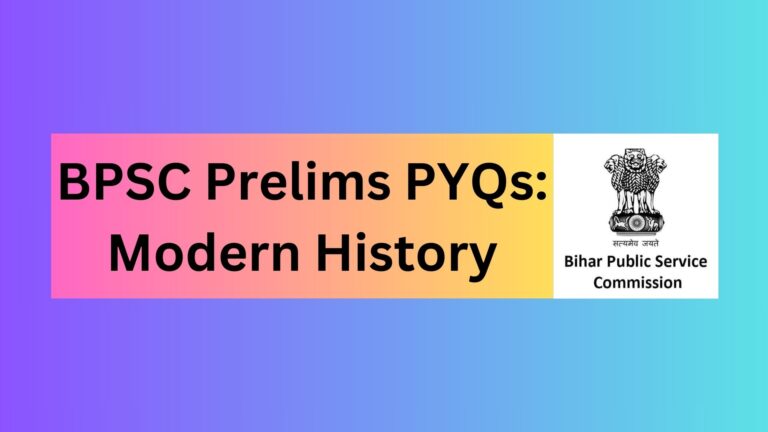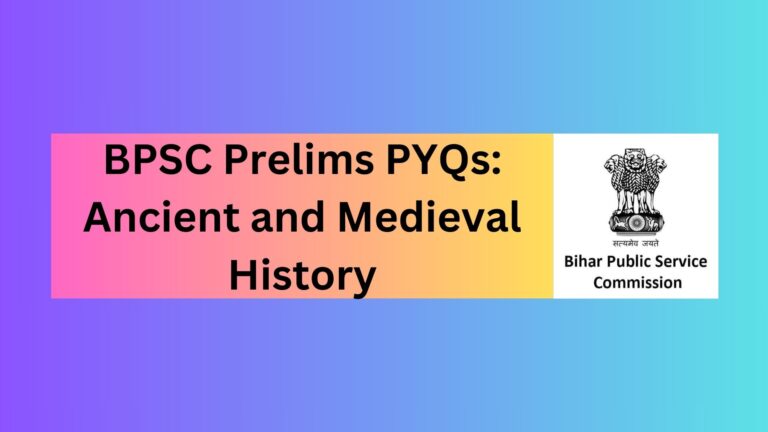
Syllabus: Indian Polity will include questions on the political system in India including Bihar.
Also Read: BPSC Prelims + Mains Syllabus
Table of Contents
Toggle70th BPSC Mains
Short Questions (All Questions were Compulsory) (38 Marks)
1. Article 32 is the “Heart and soul of the constitution of India”. Explain (8 Marks)
2. “Criminalisation of politics and politicisation of criminals”. Analyse this statement in the context of Bihar state. (8 Marks)
3. “In India, at present caste is no more a social phenomenon, rather it is a political phenomenon”. Do you agree with this statement? Analyse and give reasons to support your answer (8 Marks)
4. What is collegium ? Why is it at the center of criticism ? Express your views. (7 Marks)
5. In the light of 73rd and 74th Amendment in the constitution of India, discuss the role of local self government in empowering the women at the grassroot level in Bihar. (7 Marks)
Long Questions (Both Questions are compulsory)
1. Trace the evolution of political parties in India from one party dominance to the era of Coalition governments. Has the coalition politics undermined the authority of the Prime Minister in India? Give Reasons (38 Marks)
or
“When there is a change in Government at the Centre, the Governor also changes.” In the context of this statement examine the role of governor in India as a link between the centre and states. Can he in any way act according to his own discretion. (38 Marks)
2. “Besides being a medium of communication, language has also been effective as a symbol of identity”. In the light of this statement analyse the political impact of linguistic identity in India. (38 Marks)
or
Write an essay on the political and constitutional changes in Jammu and Kashmir after the abrogration of article 370. (38 Marks)
69th BPSC Mains
Short Questions (All Questions were Compulsory) (38 Marks)
- Critically examine the basic structure theory regarding the Indian Constitution. (8 Marks)
- Is reservation for Economically Weaker Sections (EWS) justified? Comment. (8 Marks)
- Critically describe about the amendment process of the Indian Constitution. (8 Marks)
- Examine how preamble of the Indian Constitution provides a blueprint about the goals of the Constitution. (7 Marks)
- Describe how caste census is going to influence the politics of Bihar. (7 Marks)
Long Questions (Both Questions are compulsory)
1. Discuss the institutional relationship between the President and the Prime Minister as per the Indian Constitutional text. Discuss their changing role in the present context. (38 Marks)
or
“Indian federalism is fundamentally rooted in two simultaneous pursuits of nationhood: an embrace of state-based cultural diversities and a commitment to the larger Indian Political Community.” Examine critically the nature of Indian model of federalism in the light of the above statement (38 Marks)
2. Discuss and analyze the fundamental principles of coalition politics in Bihar from the point of view of the fulfilment of the national interests specifically. (38 Marks)
or
Elucidate and evaluate the local government and its working from the point of view of the empowerment of the Panchayat Raj and the City institutions with the examples from the grassroot level in Bihar. (38 Marks)
68th BPSC Mains
Short Questions (All Questions were Compulsory) (38 Marks)
- Analyze critically the dynamic secularism in India. (8 Marks)
- Regional politics plays its role in India. Explain (8 Marks)
- The positive directions in the Constitution of India are as a charter of social and economic democracy in the country. Explain with examples. (8 Marks)
- Explain the judicial review jurisdiction of the Supreme Court of India. (7 Marks)
- Bihar has witnessed improvement in its political culture in last decades. Give examples. (7 Marks)
Long Questions (Both Questions are compulsory)
1. “Paramountcy of National Interest is enshrined in the Zonal Councils in the country.” Examine critically, the nature and working of the Zonal Councils in India in light of the above statement. (38 Marks)
or
Caste plays a role in Indian Politics. There is a change in its functioning over the decades. How do you look at its changing role over the last many decades? Does the logic of development subside the character of caste? Give your reasons. (38 Marks)
2. Election Commission of India has played an important role in conducting the elections. Critically examine its role in making the elections free and fair over the decades. Compliment your answer with reference to the conduct of elections in pre-Sheshan and post-Sheshan era in Bihar. How does it contribute to the strengthening of democracy? (38 Marks)
or
Discuss the composition and powers of Rajya Sabha and Identify its role as second chamber of the Parliament. (38 Marks)
67th BPSC Mains
Candidates had to attempt three questions. (Each Question was of 38 Marks)
- “The Indian Parliament is not a sovereign legislature. It has vast but not unlimited powers.” Comment on this statement and highlight as to why the Indian Parliament cannot be equated with its British counterpart.
- Discuss the problem of Centre-State relations in India and its prospects in future, with special reference to Bihar. Examine as to how the problem can be constructively handled in tune with cooperative federalism.
- Account for the emergence of regional political parties in India. Do you think the existence of the regional political parties is good for satisfying regional aspirations and national unity? Give reason in support of answer.
- An independent judiciary, having the power of ‘judicial review’, is a salient feature of the Constitution of India. Do you think judicial activism’ has further added to the powers of the Supreme Court? Explain with examples.
66th BPSC Mains
Candidates had to attempt three questions. (Each Question was of 38 Marks)
- “The role of the President of India is like an old man in family who has all the uthorities, however, he cannot do anything effective if the naughty-young members of family do not listen him.” Evaluate.
- Indian federal structure is constitutionally oriented towards Central Government. Explain
- “The uneven development of Indian States has created many socio-economic and political problems.” Critically analyze the statement with special reference to Bihar.
- The Parliament of India is an effective forum of national integration. Discuss.
65th BPSC Mains
Candidates had to attempt three questions. (Each Question was of 38 Marks)
- Do you agree with the view that our Constitution has given Fundamental Rights by one hand and taken them back by another hand.
- “Indian Parliament is a non-sovereign law making institute”. Evaluate this statement.
- “The system of Indian Political Parties is not nationalistic but it is individualistic.” Explain this fact in the context of Bihar state.
- What do you understand by E-Governance? Discuss the position of E-Governance implementation in Bihar.
64th BPSC Mains
Candidates had to attempt three questions. (Each Question was of 38 Marks)
- “The Indian Constitution postulates in its preamble that India shall be a socialist, secular, democratic republic.” What are the constitutional provisions to enforce this declaration?
- Critically examine the role of Governor in state politics in India, particularly in Bihar. Is he a mere puppet?
- “Judicial activism is a recent phenomenon in Indian Governance.” Comment and bring out the main arguments in favour and against of judicial activism.
- “Too many political parties are the bane of Indian Politics.” Explain this fact in the context of Bihar.
63rd BPSC Mains
Candidates had to attempt three questions. (Each Question was of 38 Marks)
- Critically examine the role of Election Commission of India in the conduct of free and fair election. What purpose does the Electoral Identity Card serve in this regard?
- Do you agree that Indian Politics today primarily revolves around development politics rather than ascriptive politics? Discuss with reference to Bihar.
- What are the implications of growing regional political parties on the Indian party politics in recent times?
- What is the difference between Constitution and Constitutionalism? Critically discuss the doctrine of ‘basic structure’ as enunciated by the Supreme Court of India.
60th-62nd BPSC Mains
Candidates had to attempt three questions. (Each Question was of 38 Marks)
- “The Directive Principles of State Policy are not mere pious declaration but clear directions for the guidance of State Policy.” Comment and show how far they have been applied in practice.
- Examine the concept of ‘Hindutva’. It is against secularism?
- Identify the major pressure groups in Indian politics and examine their role in it.
- Discuss the powers and actual position of the Governor in Bihar politics.
56th-59th BPSC Mains
Candidates had to attempt three questions. (Each Question was of 38 Marks)
- Discuss about the Fundan1ental Rights as enshrined in the Indian Constitution. How has the judicial interpretations of Article 21 expanded the scope of Right to Life?
- Examine the role of Caste in electoral politics of India. To what extent did caste factor play a role in 2015 Bihar election.
- Analyse tension areas between centre and states in the Indian federal systen1. Describe the current state of relations behveen Union Governn1ent and Bihar State.
- What is judicial review? Critically examine about the doctrine of ‘basic structure’ as enunciated by the Supreme Court of India.
53rd-55th BPSC Mains
Candidates had to attempt three questions. (Each Question was of 38 Marks)
- Discuss Indian Federal System and Centre-State Administrative Relation with special reference to National Counter-Terrorism Centre (NCTC).
- Discuss the power and functions of the Governor and his role in Bihar.
- Examine the power and working of the Election Commission of India and its role in free and fair election.
- Discuss various ‘Directive Principles’. How were these implemented in Bihar after 1950?
48th-52nd BPSC Mains
Candidates had to attempt three questions. (Each Question was of 38 Marks)
- ‘Caste and Class play important role in Indian politics.’ Explain the statement with special reference to Bihar.
- Explain the recent trends in Indian federalism. Do the states need more autonomy?
- “Coalitional politics in India has become a remarkable feature, but it is yet to provide a stable Government.” Comment.
- Analyse the functioning of the rural local governments in India since 1994 with special reference to Bihar.
Also Read: BPSC Mains PYQs Subject Wise
Follow Fusion IAS


